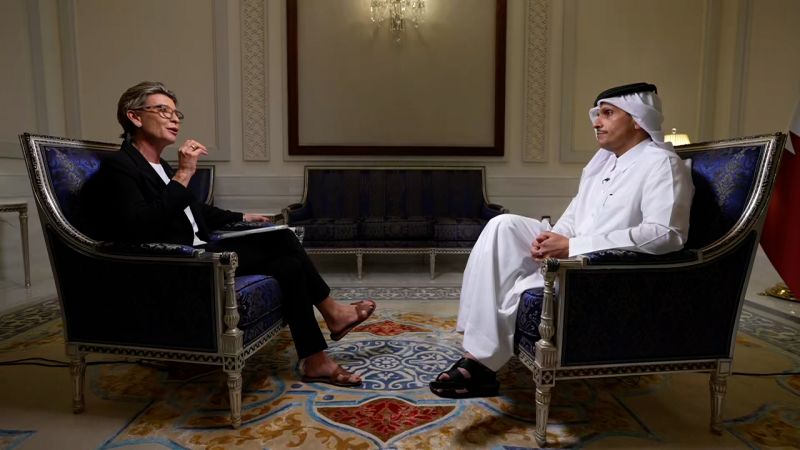In recent discussions surrounding a potential transfer of a Boeing 747-8 from Qatar to the United States, the Prime Minister of Qatar, Sheikh Mohammed bin Abdulrahman bin Jassim Al-Thani, has taken steps to clarify the nature of this transaction. He emphasized that it is not a personal gift to President Donald Trump but rather a straightforward government-to-government deal. During an interview with CNN’s Becky Anderson, Al-Thani stated that the arrangement was still undergoing legal review, portraying the transaction as an administrative exchange without personal implications involved.
The complexities surrounding this situation are further accentuated by Trump’s remarks, particularly during a Fox News interview, where he suggested that a Qatari official had approached him with the offer. Al-Thani refrained from confirming that any official from Qatar had directly presented this proposal to Trump, insisting that the matter strictly concerns the respective Ministries of Defense involved. “It is a government-to-government transaction,” Al-Thani reinforced, underlining the institutional framework as opposed to a personal favor that could taint the integrity of diplomatic relations.
As discussions progressed, the idea of accepting the jet spurred concerns across the political spectrum, not just from the Democrats but also within Trump’s own party. Prominent Republican Senator Mike Rounds, of the Senate Intelligence Committee, expressed his security concerns regarding the aircraft, drawing a parallel to the historical Trojan horse narrative of deceit. Similarly, fellow Republican Senator John Cornyn echoed apprehensions regarding the implications of accepting the plane, suggesting that significant ethical and security questions await resolution.
Al-Thani has asserted that Qatar’s intentions are devoid of ulterior motives, indicating a willingness to assist the U.S. within legal bounds. He stated, “Why would we buy an influence in the United States?” and recalled Qatar’s consistent support of U.S. interests over the past decade, notably in areas related to counterterrorism, humanitarian efforts, and geopolitical crises. Even with these reassurances, he conceded that the offer would be rescinded if it were judged to be illegal.
Having disputed any appearance of controversy in the transaction, Al-Thani reassured that legality lies at the heart of this exchange, asserting, “We will not do anything illegal.” He criticized the notion that such dealings would lack transparency, suggesting that the process is already overtly being conducted between the two governments.
President Trump has vigorously defended the plan to accept the aircraft, characterizing it as a “GIFT, FREE OF CHARGE” intended for the U.S. Defense Department. He has argued that rejecting such a generous offer would make someone “a FOOL,” defending the notion of a free gift as logical during his tenure. Trump contended he would not use the aircraft post-presidency, stating intentions of placing it in his library, similar to the fate of Ronald Reagan’s decommissioned aircraft.
The proposal has elicited alarm from several avenues, particularly from Democrats indicating ethical dilemmas and potential conflicts of interest. Senate Minority Leader Chuck Schumer announced a temporary hold on Justice Department nominees until clarification on the Qatari aircraft offer is provided, illustrating a tactical move to exert legislative pressure.
In response to questions about the legality and ethics surrounding the deal, White House press secretary Karoline Leavitt remarked that the details are “still being worked out,” maintaining that donations to the government adhere to legal standards. Compounding the scrutiny, reports have surfaced indicating that the Justice Department’s internal advisers previously cleared a memorandum from Attorney General Pam Bondi endorsing this proposed plane transfer. Bondi’s past lobbying efforts on behalf of the Qatari government prompt further questions about potential conflicts, as pointed out by Dick Durbin, a high-ranking Democrat on the Senate Judiciary Committee.
As discussions continue, representatives from Qatar have communicated that the potential transfer of the aircraft is still under deliberation within the relevant government agencies. There remains no finalized decision, indicating that both parties are ensuring a thorough review process before advancing the transaction. This evolving saga, steeped in political intrigues and diplomatic negotiations, highlights the delicate interplay of international relations amid domestic political scrutiny.



